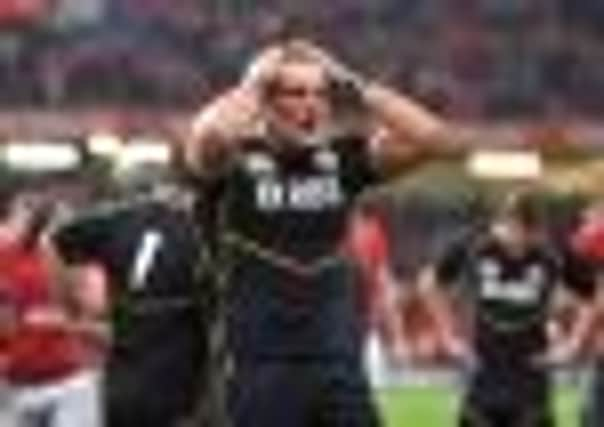Allan Massie: Strike the right balance in the backs and we have the beating of France


England at Murrayfield were a poor team. Wales are a very good one. Indeed the present Welsh back division is their best since the glory days of the 1970s. If you were picking a Lions Test XV today, Ireland’s Tommy Bowe would be the only non-Welshman from 15 to 9. The Welsh backs scored three tries against Ireland at Lansdowne Road, and three against us in Cardiff. They have enviable pace, power and skill.
There’s no need to dwell long on the turning points – our failure to score just before half-time, failure to gather the second-half restart and the two sin-binnings. Allan Jacobsen got a nudge in the back which may have caused him to knock-on, but we would probably have scored if we had moved the ball to the right a couple of phases previously. The sin-bin offences were hare-brained.
Advertisement
Hide AdAdvertisement
Hide AdI could only assume that Nick De Luca lost sight of the ball and thought it had bounced into Jonathan Davies’s hands. Rory Lamont’s indiscretion was even more culpable because Scotland were already down to 14 men. In neither case was there any immediate danger of a try.
Looking on the brighter side, however, this was a splendid game of rugby, and Scotland showed more skill and enterprise than we have for a long time. After the Calcutta Cup, I thought we would have very little chance when France come to Murrayfield for our only other home match this season. Now, so good was the Scottish forward play, with Ross Rennie, David Denton, Ross Ford and Richie Gray outstanding that I can envisage beating France – if we get the selection behind the scrum right.
We have introduced four players new to Six Nations rugby: Denton, Lee Jones, Greig Laidlaw and now Stuart Hogg; and they have all taken to international rugby like the proverbial duck to water. Some suggest shifting Laidlaw to 9 and bringing in Duncan Weir. I understand the argument but reject it.
First, Mike Blair, now back in top form, is still a better scrum-half than Laidlaw; second, Laidlaw himself is a better and more influential player at 10 than he is at 9. He has of course played most of his career at scrum-half, but it is since he was moved to 10 by Edinburgh in an emergency that he has really blossomed. So leave him there and start with the Edinburgh halves.
Stuart Hogg must surely start against France, and should play full-back. Sean Lineen has suggested that his best position may be 13, but at the moment his greatest asset is his broken-field running rather than his distribution, and there are far more opportunities to run from 15 than from outside centre.
If Max Evans isn’t fit, then Rory Lamont should play on the right wing. Indeed I might pick him even if Evans has recovered. For one thing he’s big enough to deal with the formidable Julien Malzieu. I have never been a fan of Sean Lamont at 12, but he had a good game on Sunday and passed the ball more often than he has done in the last few matches put together. His contribution to Hogg’s wrongly disallowed try was of the highest class. It was a great shame that try wasn’t given, not because it would have affected the result – it probably wouldn’t have done that even though there were still 20 minutes to go – but because it was the kind of try we have all been longing to see.
Blair showed alertness, agility and skill to set it going. Lamont ran excellently, leaving Jamie Roberts floundering, and got the ball away to Lee Jones coming up fast. He made good ground and timed his one-handed off-load to De Luca perfectly despite being tackled by two opponents. De Luca’s own pass out of the tackle was poor. Nevertheless Hogg did gather it skilfully, the ball never touching the ground, and went over. It was understandable that the referee thought there had been a knock-on, but he should surely have consulted the TMO.
Which brings one to the De Luca question. For Edinburgh he often looks a centre of the highest quality, but he has never quite cut it at international level. On Sunday he did lots of good things – some fine tackling and one very deft back-of -the-hand off-load to Rory Lamont for instance – and some that were not so good. He may be an unlucky player, but he also seems to lack confidence. He has now some 30 caps, but more than half of them off the bench, often for only a few minutes at the tail-end of a match.
Advertisement
Hide AdAdvertisement
Hide AdI would stick with him, but lots wouldn’t. He’s in danger of becoming what Dan Parks was for many, the fans’ whipping-boy, poor lad.
If I dwell on the backs it’s because the forwards are playing well enough to match anybody and to set up victories. It is particularly pleasing to see Ross Rennie flowering as the great player he looked like being before his serious knee injury, which came at a time when no less a judge than John Rutherford called him “the best rugby player in Scotland”. He has had quite a light season with Edinburgh, where Michael Bradley has often preferred the terrier-like skills of Roddy Grant, and perhaps is benefiting from coming to the Six Nations comparatively fresh.
I don’t like talk of building for the next World Cup. Nevertheless with the introduction of the new players mentioned, there is the makings of a very good team here. All that is needed now are a few tries and victories. Both will come